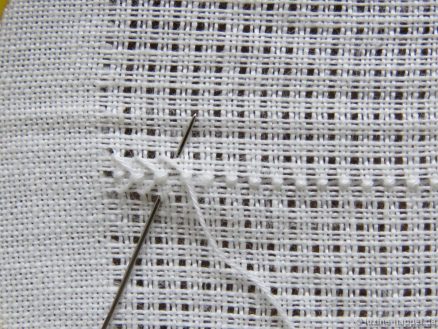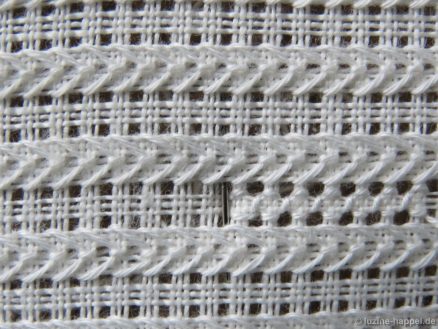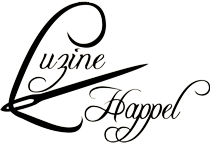Filling Pattern – No. 578
category: Limet-Filling pattern
linen used: 13.5/cm thread count
threads used: coton à broder No. 20
stitches used: Back-, Straight- and For-Sided stitches
center: center: intersection of withdrawn thread lines (in other shapes or motifs: longitudinal axis = withdrawn thread line)
one pattern segment = 12 threads
The filling pattern shown here is a practice exercise only. You can see it used in a shape in the end of this article.
First, establish a Limet grid with a withdrawn thread line as the longitudinal axis by alternately cutting 1, leaving 3, vertically and horizontally.
Turn the motif 90° counterclockwise and embroider Backstitches over 3 fabric threads each along the central longitudinal axis.
At the end of the row, after completing the last Backstitch, bring needle up one square diagonally to the top left.
Cross under the working thread of the second-to-last Backstitch,
insert the needle 2 squares below the emerging point and move the needle up two squares and one square to the right and bring it up there.
*Cross under the working thread of the next free Backstitch,
insert the needle 2 squares below the emerging point and move the needle up two squares and one square to the right and bring it up there.*
until the row is finished.
Turned back to the original position, the pattern looks like this:
In this pattern I want to add a row of Four-Sided stitches between the rows of Back- and Straightstitches. Since it is easier to start the Back- and the Straight stitches always from the same side, all of these rows are embroidered first.
To do this, leave a space of two squares between a finished row and the next row of Backstitches.
Work the row there with Backstitches and the row back with Straightstitches in the manner previously described
until the entire area is filled.
When turned back to the original position, the pattern looks like this:
Then embroider Four-Sided stitches from the back over the remaining 3-thread columns.
*To do this, take the three fabric threads above a square from right to left, move the needle downwards and take the same fabric threads below the square.
Move the needle upwards, insert it at the upper right corner of the square and bring t up again at the lower right corner.*
Repeat these three steps.
From the front it looks like this:
Once all the rows of Four-Sided stitches have been embroidered, the pattern is finished.
This pattern is particularly suitable for motifs that taper towards the bottom, such as hearts.
Since this pattern harmonizes with the outline of a bird’s wing, I embroidered a pattern strip – but still set between Stain stitch bars – for filling the wing area.




























Leave a Reply